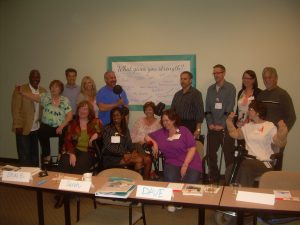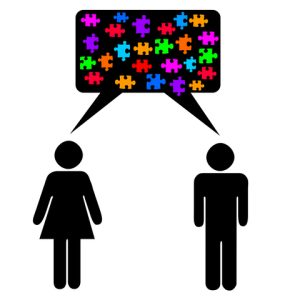“A Picture of Health on the Outside”
I was only 25 in 1980 when my MS symptoms started. My career was taking off, I was newly married, and my husband and I were active outdoors doing things like skiing and dirt bike riding. Life was good. But like all newly-diagnosed people with MS, the fear of having the rest of my life ahead of me with a chronic, debilitating, progressive disease with no cure was frightening to say the least.
What kind of life could I expect?
Flash forward to present day, 35 years later. Life has been good despite the challenges of living with MS while also dealing with other challenges in life that “normal” people endure. Adjustments to changes in my life seemed constant, as my MS Blogger Buddy Nicole Lemelle would say, would become “My New Normal.” And I’m currently facing two more…
Truthfully, I hate MS—it’s interfering, unpredictable, and invisible in so many ways. I didn’t have a choice about getting it, but I did have a choice about whether I was going to let it control me or manage my life. It took time, but I learned to manage my MS well. It helped that I am a positive person with an “I can do this” attitude.
Difficult decisions had to be made—giving up my career, having only one child, going on disability, having to move out of my house… It was hard. But amazingly for me, in the end each difficult decision resulted in a good outcome.
I can honestly say that I have, and will continue to have a fulfilling life with my husband of thirty-seven years and my 32-year old son. Not only have I been an avid swimmer, crafter, and reader for as long as I can remember, my love of history and nature was satisfied after visiting all fifty States, seven countries in Europe, Canada, Mexico and the Caribbean. Many of these trips I made in a wheelchair.
As I journeyed through motherhood, I enjoyed being a soccer mom, wrestling mom, homeroom mother, and a volunteer in my son’s school, church and community. In-between, I learned Spanish and tutored high-schoolers for fifteen years. And I was involved as a volunteer and in other roles in the MS community for the past thirty years. I’m proud to say I authored a book, Managing MS: Straight-Talk… published in January 2012, and since then learned social media and built a website through which I have interacted within the MS community since.
I have always practiced health and wellness as a critical component of managing my MS and chose my medications carefully. Good sleep, regular fitness, healthy diet choices, stress management… Recently at my annual physical, my doctor said to me “I have good news and I have bad news.”
The good news? Out of all her patients that day, I was the healthiest– perfect scores on all my tests: blood pressure, weight, cholesterol, pulse, circulation, Vitamin D, calcium, and all the other things that are measured when blood is checked.
The bad news? I have severe osteoporosis in my hips and osteopenia in my spine—the worse she has ever seen. I had most of the risk factors for it: genetics, years of steroids, being thin, post-menopausal, and little weight-bearing fitness due to being in a wheelchair for fifteen years. The first of two new adjustments that I have to research and work on. This is serious stuff.
When you look at that picture of me, it is a definite portrayal of that old expression that makes all of us with MS cringe: “But you look so good!” You can’t see the osteoporosis, just like you can’t see so many of my MS symptoms. Though I use a scooter or wheelchair because I can’t walk anymore, many folks have asked me if I had an accident. They can’t see the pain, the numbness, weakness, the bladder/bowel problems, or the fatigue and emotional issues that I live with daily.
And now that the new ridiculous TV commercial about Tecfidera is airing, people are getting the misconception that there is a pill—a cure—that Relapsing/Remitting MSers can take that will give them the ability to be active and normal all day long. What a hurtful setback for me and all of the other MS patients that have been trying so hard to get people to understand what MS really is all about.

Shame on you, Biogen.
I don’t know. At first I thought that no awareness was better than misleading awareness, but maybe this commercial will stir up the pot and get people talking more about MS.
Throughout my entire life, I have always been a doer and a helper with some purpose to serve. Even in the toughest spells throughout my life due to MS or something else, I forged forward to reach out. However, I’ve reached the point where I’m so tired and I hurt almost all the time now. I have been wrestling with this question for a while, “Is it time to quit?” That means the second, big adjustment into unknown territory—true retirement.
Actually, I won’t let go of everything completely; I will share and care about MS on a limited basis through my social media sites. But I’ll let the MS blogging be carried on by great, credible others that I got the privilege of knowing from social media and attendance to a MS Blogger Summit sponsored by EMD-Serono/Pfizer:
MS Bloggers and some Significant-Other Caretakers
(Sitting, L to R)
Laura Kolaczkowski
Lisa Emrich
Nicole Lemelle,
Lisa Dasis
Yvonne Desousa
Debbie Petrina
(Standing, L to R)
Jon Chandonnet
David Lyons
Stuart Schlossman
Dave Bexfield
There are other great MS bloggers around too, such as those on Multiple Sclerosis.net, that can be trusted to obtain quality MS info, inspiration and education.
Living with MS for 35 years and being involved with the MS community in so many ways teaches a person a lot of things. This is the last page of my practical MS guide book Managing MS: Straight Talk From a 31-Year Survivor that I published in January 2012:
Final Words of Inspiration
September 28, 2011
Life is precious, challenging, and worth getting out of it what you can.
Being a lover of American history, one of the items on my bucket list was to visit the actual trail of the Lewis & Clark expedition. I just returned from an RV road trip with my husband and brother to do this. During the trip, I reflected on the similarities of their journey and life with MS.
When Lewis & Clark began their journey to the Pacific Ocean across the continent, they went into unknown territory. Daily they encountered obstacles in the wilderness they had to overcome, and had to rely heavily on the support of each other/ strangers, their skills, ingenuity, and creativity in order to survive and prevail. The team of thirty-three persons suffered; one died. They experimented. They documented. They learned. They managed and accomplished incredible hardships. There were moments of the deep despair and defeat, and moments of high joy and success.
They found their way. I found my way. You will find your way.
Debbie
www.DebbieMS.com
Author, MS Counselor/Consultant
*Image courtesy of “rakratchada torsap” portfolio at Free DigitalPhotos.net





 “Strategies & Tips”
“Strategies & Tips”